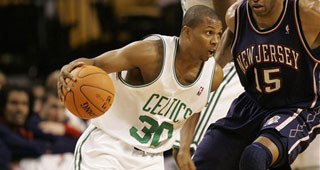Sebastian Telfair may indeed end up being the next great point guard out of New York City and the point guard of the future for the Boston Celtics (though Lehane?s money is on Rajon Rondo), but if that is going to happen Telfair?s on court handle will have to be far better than the crisis communications handle the Boston Celtics have shown so far.
As many NBA fans know, Telfair, and by extension the Celts, have become embroiled in the Monday night shooting of rapper Fabolous outside a Manhattan restaurant ? the same restaurant where earlier in the night Telfair had his gold necklace stolen. To date, there have been conflicting news reports about exactly what went down and where the NYPD?s investigation is leading in terms of what role, if any, Telfair may have had in the incident.
One thing that is clear, however, is that the Celtics managed this incident in a way that has made it worse ? not better -- for the team and player and, in doing so, have needlessly inflicted some long-term damage on the organization in a time period when it could least sustain such damage.
It?s the cover-up. The team, by intentionally trying to cover-up why Telfair did not appear for the second half of the exhibition game against the Knicks on Monday, actually generated more negative press coverage, more hard questions, more skeptical scrutiny and more suspicion around the incident than they would have by just being straight with the press and public. We see this reaction ? call it the cover-up instinct -- all the time in politics and business. It?s human nature. But it is not the way to manage a crisis situation. The extent of Telfair?s involvement in the shooting on Monday night could very well end up being worthy of being merely a minor story ? but the Celtics? effort to try to keep the matter under wraps has had the exact opposite effect: It has made it into a much bigger story. The way the Celtics responded could ultimately be a major disservice to Telfair, who is now being introduced to a large number of Celtics fans through the prism of an incident magnified by the organization?s inept crisis management tactics.
Maintain your credibility with you target audience. The Celtics failed to appreciate how their actions would impact the team?s credibility with its single most important audience: Celtic fans. Any time you are in a crisis, you have to recognize that you cannot go back in time and change what took place and that your target audience ? whether it be voters for a political candidate, shareholders for a public company or fans for a sports team ? will evaluate your organization based on how it responds to the crisis going forward. And, in this context, maintaining credibility with the targeted audience is THE most important thing that can be done. This is particularly true for the Celtics who are trying to re-build what was long ago (in the era of when Tommy Heinsohn did network play-by-play analysis) one of the greatest sports franchises in history and who have in more modern times been preaching that their youth movement reflects a long-term plan (by the way, is there a statute of limitations on how long you can claim to have a youth moment before the young people are no longer young?).
The Telfair affair is a blow to the credibility of an organization that has squandered so much of it since the Big Three (Bird, the Chief and McHale) left ? a revolving door of head coaches, questionable trades (just imagine if Joe Johnson and Chauncy Billups were playing with Paul Pierce), re-building followed by re-building and setting expectations way too high (see the premature elevation of Al Jefferson?s jersey to the rafters).
Do not throw fuel on the fire. The Celtics do not seem to appreciate that the situation will be driven fundamentally not by what they say ? but by a legal process over which they have no control and that the team?s various responses ? from the GM offering his comments to the owner discussing the matter on the radio to the team?s various responses has only thrown fuel on the fire and made this a multiple day, ongoing story.
Any time an organization is in the vortex of an ongoing criminal justice matter where the issues are not clear and which will be driven by forces out of its control, it is imperative that the organization not add fuel to the fire by introducing shifting comments or new news. Instead the organization in crisis must stake out one basic position from the very beginning that it knows to be accurate and which it can sustain for the long haul -- and then stick to that position.
The team?s public position on Telfair should be disciplined, should be limited and should be consistent: ?Given that this is an ongoing legal process involving law enforcement, it is not appropriate for us to comment beyond saying that we support Sebastian. Any other questions are best directed to the NYPD.? Period.
Sports organizations in today?s modern media age are under incredible duress to effectively manage crisis situations that are, unfortunately, inevitable. It is critical that these teams appreciate the need to take the long-term view and appreciate that at the end of the day what has happened has happened and that, moving forward, the only thing that really matters is how the team?s response will impact the organization over the long haul.


